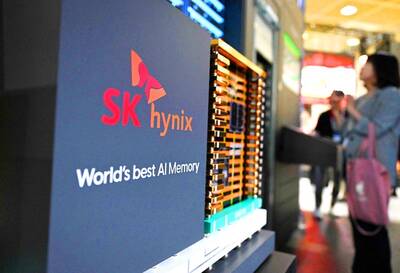The nation's stock regulator said yesterday that it plans to further relax trading restrictions in the next six months as part of the government's efforts to lure more overseas investors to Taiwan's stock markets.
The Taiwan Stock Exchange hoped the eased measures will help lift the nation to "developed market status" in the FTSE global equity index, said Wu Nai-jen (
FTSE International Ltd is scheduled to conduct its annual country-classification examination in September of next year.
Wu said the status upgrade, if realized, will attract more foreign funds into local stock markets, as most investors adjust their portfolio based on FTSE's country classifications.
Taiwan, currently classified as an advanced emerging market, is on the FTSE's watch list for possible promotion to developed market status, along with South Korea.
"To meet the criteria and to meet the anticipation of international investors, we have to loosen current stock-transaction restrictions to a certain degree," Wu said.
Stock Lending
At the top of the exchange's priorities for next year is a plan to loosen restrictions on stock lending, a long-term concern of foreign institutional investors, according to Wu.
Stock lending is defined as the temporary transfer of securities, by a lender to a borrower, with the borrower agreeing to return equivalent securities to the lender at a pre-agreed time, according to the British Bankers' Association Web site.
In Taiwan, institutional investors are now required to provide collateral to gain approval for stock lending for hedging purposes, a practice not seen in most developed markets.
"We hope the job will be done within the next six months to make it in time [for the review]," Wu said.
Large Transactions
As part of the relaxation, the regulator also plans to lift the restriction on large-volume transactions -- those exceeding 500,000 stocks -- during regular trading hours, the exchange's president Chen Ming-tai (
Moreover, the exchange will also work to scrap a ban on shares being sold at prices lower than their latest closing price, Chen said.
Taiwan in late 1998 banned investors from selling borrowed shares at a price lower than the previous day's close, in a bid to stabilize the market.
George Wu (
"Taiwan is on the right track toward developed-market [status] and this will bring more foreign fund flows to the bourse, as foreign investors will increase their local share position in response to a higher weighting in the FTSE," Wu said.
Aside from the relaxation, the exchange will also increase its examination of the financial results of companies traded on the Taiwan Stock Exchange, in the wake of a string of financial scandals led by chipmaker Procomp Informatics Co (
"To avoid similar scandals, there will be more stringent oversight rules starting next year," Chen said.
Regular checks of financial reports will increase sharply to 23 percent of the 697 listed companies, from the current 16 percent, Chen said.

Intel Corp chief executive officer Lip-Bu Tan (陳立武) is expected to meet with Taiwanese suppliers next month in conjunction with the opening of the Computex Taipei trade show, supply chain sources said on Monday. The visit, the first for Tan to Taiwan since assuming his new post last month, would be aimed at enhancing Intel’s ties with suppliers in Taiwan as he attempts to help turn around the struggling US chipmaker, the sources said. Tan is to hold a banquet to celebrate Intel’s 40-year presence in Taiwan before Computex opens on May 20 and invite dozens of Taiwanese suppliers to exchange views

Application-specific integrated circuit designer Faraday Technology Corp (智原) yesterday said that although revenue this quarter would decline 30 percent from last quarter, it retained its full-year forecast of revenue growth of 100 percent. The company attributed the quarterly drop to a slowdown in customers’ production of chips using Faraday’s advanced packaging technology. The company is still confident about its revenue growth this year, given its strong “design-win” — or the projects it won to help customers design their chips, Faraday president Steve Wang (王國雍) told an online earnings conference. “The design-win this year is better than we expected. We believe we will win

Power supply and electronic components maker Delta Electronics Inc (台達電) yesterday said it plans to ship its new 1 megawatt charging systems for electric trucks and buses in the first half of next year at the earliest. The new charging piles, which deliver up to 1 megawatt of charging power, are designed for heavy-duty electric vehicles, and support a maximum current of 1,500 amperes and output of 1,250 volts, Delta said in a news release. “If everything goes smoothly, we could begin shipping those new charging systems as early as in the first half of next year,” a company official said. The new

SK Hynix Inc warned of increased volatility in the second half of this year despite resilient demand for artificial intelligence (AI) memory chips from big tech providers, reflecting the uncertainty surrounding US tariffs. The company reported a better-than-projected 158 percent jump in March-quarter operating income, propelled in part by stockpiling ahead of US President Donald Trump’s tariffs. SK Hynix stuck with a forecast for a doubling in demand for the high-bandwidth memory (HBM) essential to Nvidia Corp’s AI accelerators, which in turn drive giant data centers built by the likes of Microsoft Corp and Amazon.com Inc. That SK Hynix is maintaining its